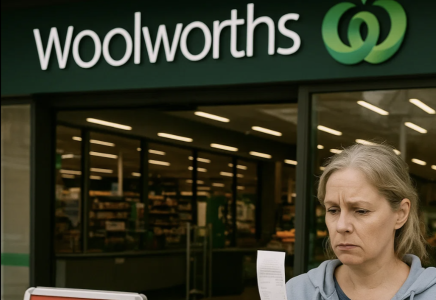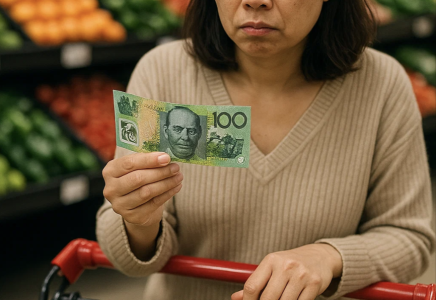GST to 15%? Bold Fix or Budget Blowout in Disguise?
- Replies 0
At the supermarket checkout these days, most of us are already pinching pennies. Now imagine adding a 15% GST to your bill – including on items that were previously tax-free.
Sounds far-fetched amid a cost-of-living crunch, right? Yet that’s exactly the bold idea some are floating, with a sweetener attached to soften the blow.
The architects of this plan, independent MP Kate Chaney and economist Richard Holden, claim it could leave many people better off. They say the lowest 60% of income earners would actually come out ahead, even as the change pours an extra $23.8 billion into the federal budget in a year. The trick? By giving back via the rebate while taking through a higher GST, the idea is to shield lower-income Australians while still raising much-needed revenue.
Why rock the boat with a tax hike now? Chaney and Holden argue that Australia’s tax system needs an overhaul to deal with an ageing population and persistent budget deficits. Younger working Australians, they note, are currently carrying a growing load to fund services, while the tax base shrinks. In their view, we lean too heavily on income tax and not enough on consumption.
Holden points out that Australia raises “about twice as much” from income taxes and “about half as much” from GST compared to other advanced economies – an imbalance they say stifles growth and fairness. A broader, higher GST (with compensation) could spread the burden more evenly and shore up revenue for the long haul.
The opposition isn’t exactly cheering either. Shadow finance minister James Paterson noted that about two-thirds of the extra GST revenue would just be handed straight back as rebates, questioning the efficiency of the plan. He also warns against taxing things that were deliberately left GST-free when the tax was introduced, like private health and education, calling it unjust to tax people for using those services on top of everything else. It would take an “incredibly brave government” to put new taxes on such essentials, Paterson quipped – code for “political suicide”.
Source: 9 News Australia / Youtube.
The Greens have slammed the idea as well. They call Chaney’s plan “a lazy idea”, saying it’s absurd to hike taxes on essentials in the middle of a cost-of-living crisis. “Since the pandemic the cost of essentials has skyrocketed, and the best idea the Teals can come up with is to make food more expensive?” Greens Senator Nick McKim said incredulously. Instead of squeezing consumers, he argues, the government should tax big corporations and the ultra-wealthy (noting that one in three large companies pays no tax at all).
History is also weighing against the GST shake-up. The original GST only passed in 2000 after John Howard agreed to exempt most basic food items to get it through the Senate. No government since has dared to increase the rate or remove those exemptions. Even Liberal PM Malcolm Turnbull flirted with raising the GST to 15% in 2015, only to drop the idea under public and internal pressure. Politicians have learned that touching the GST can be like grabbing a live wire – do it at your own peril.
But let’s be honest: $22,000 a year (about $423 per week) only goes so far these days. It’s easy to blow past that threshold between groceries, power bills, insurance, and the occasional splurge on the grandkids. Beyond that point, you’d be paying the full 15% tax on every extra dollar spent.
That means seniors could feel a real squeeze. A weekly grocery shop full of fresh food that used to be GST-free would suddenly cost 15% more. Annual private health insurance premiums – which many older Australians budget for – could jump by that same percentage if those currently GST-exempt premiums are taxed. Even seeing the doctor or specialist might cost more if healthcare services lose their exemption. The rebate would put money back in your pocket later, but you’d still need to front up the extra cash at the checkout or the clinic.
Supporters of the plan counter that the rebate and other measures would ensure most low-income households (including many age pensioners) are protected. And any inflation from the GST hike could eventually lead to higher indexation of pensions and benefits. Moreover, some older Australians might agree with the principle behind the change – the idea of everyone chipping in a bit more now to secure funding for aged care, healthcare, and a stronger budget for future generations. But that’s a tough pitch to make when you’re staring at a higher grocery bill on a tight budget.
Many seniors also feel a sense of déjà vu. They remember the promises made when the GST was first introduced – like the pledge to never tax basic food. Now, seeing those long-standing exemptions on the chopping block can feel like a breach of trust. Change is always hard, but especially so when it affects the staples of everyday life.
Ultimately, it’s a classic dilemma: is this a case of short-term pain for long-term gain, or just too much pain full stop? Older Australians have seen plenty of “reforms” come and go, and they know a mixed blessing when they see one. This plan offers an appealing rebate and a promise of a more sustainable future, but it also asks everyone to pay more out-of-pocket in the here and now.

So, would you be willing to pay a bit extra on everyday items if it meant a stronger economy and less debt on the shoulders of your kids and grandkids? Or is a 15% GST simply a bridge too far for Australia?
Sounds far-fetched amid a cost-of-living crunch, right? Yet that’s exactly the bold idea some are floating, with a sweetener attached to soften the blow.
The Bold Plan: 15% GST and a $3,300 Sweetener
A new proposal suggests raising Australia’s Goods and Services Tax from 10% to 15%, while scrapping current GST exemptions on things like fresh food, education, and health. In return, every Australian adult would get a $3,300 yearly payment – essentially making the first $22,000 of spending GST-free. This hefty rebate is meant to blunt the pain of higher prices on essentials.The architects of this plan, independent MP Kate Chaney and economist Richard Holden, claim it could leave many people better off. They say the lowest 60% of income earners would actually come out ahead, even as the change pours an extra $23.8 billion into the federal budget in a year. The trick? By giving back via the rebate while taking through a higher GST, the idea is to shield lower-income Australians while still raising much-needed revenue.
Why rock the boat with a tax hike now? Chaney and Holden argue that Australia’s tax system needs an overhaul to deal with an ageing population and persistent budget deficits. Younger working Australians, they note, are currently carrying a growing load to fund services, while the tax base shrinks. In their view, we lean too heavily on income tax and not enough on consumption.
Holden points out that Australia raises “about twice as much” from income taxes and “about half as much” from GST compared to other advanced economies – an imbalance they say stifles growth and fairness. A broader, higher GST (with compensation) could spread the burden more evenly and shore up revenue for the long haul.
A Political Hot Potato (Reactions and Risks)
Not surprisingly, the 15% GST pitch has proven to be a tough sell politically. Prime Minister Anthony Albanese and Treasurer Jim Chalmers have repeatedly ruled out any GST increase or expansion for now – they simply have no appetite to touch the GST this term.The opposition isn’t exactly cheering either. Shadow finance minister James Paterson noted that about two-thirds of the extra GST revenue would just be handed straight back as rebates, questioning the efficiency of the plan. He also warns against taxing things that were deliberately left GST-free when the tax was introduced, like private health and education, calling it unjust to tax people for using those services on top of everything else. It would take an “incredibly brave government” to put new taxes on such essentials, Paterson quipped – code for “political suicide”.
Source: 9 News Australia / Youtube.
The Greens have slammed the idea as well. They call Chaney’s plan “a lazy idea”, saying it’s absurd to hike taxes on essentials in the middle of a cost-of-living crisis. “Since the pandemic the cost of essentials has skyrocketed, and the best idea the Teals can come up with is to make food more expensive?” Greens Senator Nick McKim said incredulously. Instead of squeezing consumers, he argues, the government should tax big corporations and the ultra-wealthy (noting that one in three large companies pays no tax at all).
History is also weighing against the GST shake-up. The original GST only passed in 2000 after John Howard agreed to exempt most basic food items to get it through the Senate. No government since has dared to increase the rate or remove those exemptions. Even Liberal PM Malcolm Turnbull flirted with raising the GST to 15% in 2015, only to drop the idea under public and internal pressure. Politicians have learned that touching the GST can be like grabbing a live wire – do it at your own peril.
What Would a GST Hike Mean for Seniors?
For older Australians, who often live on fixed incomes or modest superannuation, a GST increase raises immediate concerns. The proposal’s $3,300 rebate would cover the GST on roughly the first $22,000 of spending per year. So if you’re a frugal pensioner who doesn’t spend beyond that on taxable goods, you’d come out roughly even – you might even be slightly ahead with the rebate.But let’s be honest: $22,000 a year (about $423 per week) only goes so far these days. It’s easy to blow past that threshold between groceries, power bills, insurance, and the occasional splurge on the grandkids. Beyond that point, you’d be paying the full 15% tax on every extra dollar spent.
That means seniors could feel a real squeeze. A weekly grocery shop full of fresh food that used to be GST-free would suddenly cost 15% more. Annual private health insurance premiums – which many older Australians budget for – could jump by that same percentage if those currently GST-exempt premiums are taxed. Even seeing the doctor or specialist might cost more if healthcare services lose their exemption. The rebate would put money back in your pocket later, but you’d still need to front up the extra cash at the checkout or the clinic.
Supporters of the plan counter that the rebate and other measures would ensure most low-income households (including many age pensioners) are protected. And any inflation from the GST hike could eventually lead to higher indexation of pensions and benefits. Moreover, some older Australians might agree with the principle behind the change – the idea of everyone chipping in a bit more now to secure funding for aged care, healthcare, and a stronger budget for future generations. But that’s a tough pitch to make when you’re staring at a higher grocery bill on a tight budget.
Many seniors also feel a sense of déjà vu. They remember the promises made when the GST was first introduced – like the pledge to never tax basic food. Now, seeing those long-standing exemptions on the chopping block can feel like a breach of trust. Change is always hard, but especially so when it affects the staples of everyday life.
Final Thoughts: Necessary Medicine or More Pain?
Neither major party seems keen to swallow this GST medicine right now. It’s far easier politically to kick the can down the road than to hike a tax that hits every voter’s wallet. But as Australia’s cost pressures and care needs grow, the debate isn’t likely to disappear. Down the track, if the budget crunch worsens, a GST increase (sweetener or not) could return to the national agenda – whether we like it or not.Ultimately, it’s a classic dilemma: is this a case of short-term pain for long-term gain, or just too much pain full stop? Older Australians have seen plenty of “reforms” come and go, and they know a mixed blessing when they see one. This plan offers an appealing rebate and a promise of a more sustainable future, but it also asks everyone to pay more out-of-pocket in the here and now.
Key Takeaways
- Bold GST Hike Proposal: A plan is on the table to lift Australia’s GST from 10% to 15% and end exemptions on essentials like fresh food, education, and health – a dramatic change aimed at boosting revenue.
- $3,300 Rebate for All: To offset the pain, every Australian adult would receive a $3,300 annual “basics rebate,” effectively making the first $22,000 of spending GST-free. This means many low-income earners (including pensioners) would come out ahead overall despite the higher GST.
- Economic Rationale: Supporters argue the GST hike would fix a skewed tax system and secure funding for the future. Australia currently leans heavily on income taxes; shifting towards consumption tax could ease the burden on workers and help plug the budget deficit.
- Backlash and Impact: Critics call the idea politically toxic and worry it will raise the cost of living. The government has ruled out increasing the GST for now, and opponents like the Greens label the plan “lazy” for taxing essentials instead of billionaires. Many seniors, in particular, fear a 15% GST would stretch their fixed incomes – even with the promised rebate – making this proposal a hard sell in the court of public opinion.
So, would you be willing to pay a bit extra on everyday items if it meant a stronger economy and less debt on the shoulders of your kids and grandkids? Or is a 15% GST simply a bridge too far for Australia?









